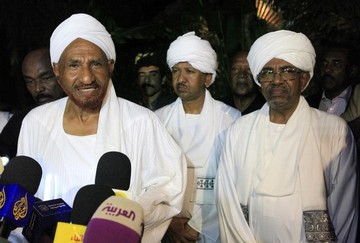Al-Mahdi: Sudan’s government offered to guarantee my safety and to share power
September 12, 2015 (KHARTOUM) – Former Sudanese prime minister and leader of the Umma Party al-Sadig al-Mahdi disclosed that the government had offered to share power with him three times: in 1993, 1996, and 2008. He also said the government pledged to guarantee his personal safety in case he returns home and take part in the national dialogue.

In an interview with the Saudi daily Al Yom on Saturday, al-Mahdi denied that his ultimate aim was power, indicating that the regime offered to share power three times.
When asked if the offer was for him to become premier with al-Bashir continuing as President, al-Mahdi said “We didn’t get into the details, as I turned down the offer right from the beginning – in 93, 96, and again in 2008”.
“I am not after power. The problem in Sudan is not who should rule but rather how Sudan should be ruled? What is the point in reaching an agreement if war will continue?” He added.
NATIONAL DIALOGUE
Regarding national dialogue, al-Mahdi said it was his brain child, referring to a series of meetings held between the two men and officials from his party with the ruling National congress Party.
“President al-Bashir was insisting that he would not talk to anyone except the armed groups, and that it had to be on bilateral basis, while I always insisted that we needed a dialogue that does not exclude anyone.”
According to al-Mahdi, al-Bashir later adopted his viewpoint and announced the so called ‘upheaval declaration’ in January 2014, inviting for an all-inclusive dialogue.
He said his party accepted al-Bashir’s call of January 2014 but it soon walked out as did the Reform Now Movement, while the armed forces and the leftists, rejected it from the start.
He pointed out his opposition to give the chairmanship of the national dialogue to President Omer al-Bashir who is also the chairman of the ruling party.
“I refused because he can’t be the opponent and the judge at the same time. If we are having seven members from the government and seven from the opposition, then having al-Bashir as chairman will turn it into (8+7). The chairman of the dialogue must be neutral,” he said, suggesting that it should be assigned to a judge, as was the case in South Africa.
At his latest address of the Sudanese community in China last week, al-Bashir reiterated that no one but him would chair the national dialogue.
Al Mahdi added that the other reason that tempted him to quit the dialogue was that the Khartoum regime could not tolerate his criticism and arrested him. “I told them if you want dialogue you will need to guarantee freedom of speech,” he said.
He described the ongoing dialogue as ‘dilapidated and useless’. “The Umma and other parties have walked out, leaving behind only the pro-government parties. It has now turned into a unilateral dialogue.”
He dismissed as ‘malice’ accusations that he was trying to internationalize the dialogue.
“It was the Sudanese government that brought in Thabo Mbeki, the head of the High African Mechanism,” he said. “Besides, every single agreement they concluded was abroad, and involved foreign bodies,” he added.
“16 agreements were signed outside the Sudan. Secondly, Sudan is hosting 35 thousand soldiers under an agreement with the government. Besides, Sudan is now vulnerable to 62 Security Council resolutions. Add to this: there are four million in Sudan who are depending for their life on foreign aid. Is there any internationalizing more than that?”Said the former prime minister.
THE RETURN HOME
Al-Mahdi said it was unlikely that he would be arrested or prosecuted in case he returned home because the government wants him to return and take part in the dialogue. “They communicated to me more than once that they will guarantee my safety,” he said.
He asserted that he will go back home shortly but he declined to give a specific date.
He criticized President al-Bashir for having announced that he would prosecute al-Mahdi for signing the Paris Declaration with the Sudanese Revolutionary Front (SRF).
“If he were wise, he would have bestowed me with medals of honour because I have managed to convince SRF to renounce power as a means to overthrow the regime and adopt political means instead. Also, rather than demanding self-determination for some regions, I convinced them to talk about a Sudan that accommodates everyone,” he said.
“I have succeeded where the regime has failed. SRF has announced that it will put down arms once a political agreement has been reached,” he concluded.
(ST)
